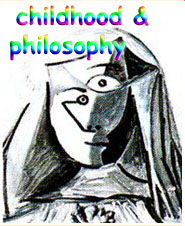teaching critical thinking and metacognitive skills through philosophical enquiry. A practitioner's report on experiments in the classroom.
DOI:
https://doi.org/10.12957/childphilo.2019.46229Keywords:
philosophical enquiry, critical thinking, metacognition, philosophy with childrenAbstract
Although expert consensus states that critical thinking (CT) is essential to enquiry, it doesn’t necessarily follow that by practicing enquiry children are developing CT skills. Philosophy with children programmes around the world aim to develop CT dispositions and skills through a community of enquiry, and this study compared the impact of the explicit teaching of CT skills during an enquiry, to The Philosophy Foundation's philosophical enquiry (PhiE) method alone (which had no explicit teaching of CT skills). Philosophy with children is also said to improve metacognitive (MC) skills but there is little research into this claim. Following observable problems with ensuring genuine metacognition was happening in PhiE sessions - on a reasonably strong understanding of what metacognition is – a method has been developed and trialed in this study to bring together, in mutual support, the development of critical thinking and metacognitive skills. Based on the work of Peter Worley and Ellen Fridland (KCL)The Philosophy Foundation ran an experimental study with King's College London in Autumn 2017 and Autumn 2018 to compare the impact of teaching CT skills and MC skills against classes which just have philosophical enquiry. The approach developed and used for the study employs the explicit teaching of some CT and MC skills within the context of a philosophical enquiry (as opposed to stand-alone teaching of these skills) and yields some positive findings both qualitative and quantitative. Both studies took place over one term (12 weeks) and a control and intervention group were used in each study. This report focuses on the second year of the study, with 220 ten and eleven-year-old children involved in eight classes across three state schools in South East London. Although there were limitations to the study the results indicate that the explicit teaching of these skills during a philosophical enquiry can help children use CT and MC skills more successfully than philosophical enquiry alone.
Downloads
References
Ackerman, Phillip L. 1987. Individual differences in skill learning: An integration of the psychometric and information processing perspectives. Psychological Bulletin, 102, pp. 3-27.
Alexander, Joyce M.; Carr, Martha; & Schwanenflugel, Paula J. 1995. Development of metacognition in gifted children: Directions for future research. Developmental Review, 15, pp. 1-37.
Alvarez Ortiz, Claudia M. 2007. Does Philosophy Improve Critical Thinking Skills? https://www.reasoninglab.com/wp-content/uploads/2015/10/Alvarez-Final_Version.pdf.
Education Endowment Foundation (EEF), Teaching and Learning Toolkit. Available from https://educationendowmentfoundation.org.uk/evidence-summaries/teaching-learning-toolkit/
Education Endowment Foundation (EEF) Meta-cognition and self-regulation. Available from https://educationendowmentfoundation.org.uk/resources/teaching-learningtoolkit/meta-cognition-and-self-regulation/.
Ericsson, K. Anders; Krampe, Ralf Th.; & Tesch-Romer, Clemens. 1993. The role of deliberate practice in the acquisition of expert performance. Psychological Review, 100, pp. 363-406.
Facione, Peter. 1989. Critical Thinking: A Statement of Expert Consensus for Purposes of Educational Assessment and Instruction. Research Findings and Recommendations. https://files.eric.ed.gov/fulltext/ED315423.pdf.
Fisher, Robert. 2007. Dialogic teaching: developing thinking and metacognition through philosophical discussion. Early Child Development and Care, 177:6-7, 615-631.
Fridland, Ellen; & Moore, Richard. 2014. Imitation reconsidered. Philosophical Psychology, 28(6), 856-880.
García-Moriyón, Felix; Rebollo, Irene; Colom, Roberto. 2005. Evaluating Philosophy for Children: A Meta-Analysis https://www.researchgate.net/profile/Felix_Garcia_Moriyon/publication/290944083_Evaluating_Philosophy_for_Children/links/586aacdd08aebf17d3a4b54b/Evaluating-Philosophy-for-Children.pdf.
Botella, Juan; Centeno-Gutiérrez, Diana; García, Felix; and González Lamas, Jara. 2018. Does Philosophy for Children make a difference? Family Resemblances: Current Trends in Philosophy for Children (Ed.s Duthie, Garcia Moriyon, Robles Loro). http://my.icpic.org/news.html#!/posts/New-book-Family-Resemblances/22.
Gardner, Susan. 1995. Inquiry is no mere conversation. Critical and Creative Thinking, 3 (2), 38-49.
Garlikov, Rick. 2002. Reasoning: What it is to be rational: Available: http://www.akat.com/reasoning.htm.
Gasparatou, Renia. 2016. Philosophy for / with Children and the Development of Epistemically Virtuous Agents. The Routledge International Handbook of Philosophy for Children, 12, 103-110, ed Gregory M. R., Haynes, J. Murris, K. Taylor & Francis.
Gregory, Maughn. 2008. Facilitating Classroom Dialogue. Teaching Philosophy, Vol, 30, No. 1 pp. 59-84.
Gorard, Stephen; Siddiqui, Nadia; & Huat See, Beng. 2015. Philosophy for Children Evaluation Report and Executive Summary for Education Endowment Foundation. https://educationendowmentfoundation.org.uk/public/files/Projects/Evaluation_Reports/EEF_Project_Report_PhilosophyForChildren.pdf.
Haynes, Joanna and Murris, Karin. 2011. Picturebooks, Pedagogy and Philosophy. Routledge Research in Education.
Murris, Karin. 2008. Philosophy with Children, the Stingray and the Educative Value of Disequilibrium. Journal of Philosophy of Education 42(3-4), 667-685.
Murris Karin. 1992. Teaching Philosophy with Picture Books (out of print).
Murris, Karin and Haynes, Joanna. 2002. Storywise: thinking through stories. Dialogue Works.
Oyler, Joseph. 2015. Expert Teacher Contributions to Argumentation During Inquiry Dialogue, Theses, Dissertations and Culminating Projects, https://digitalcommons.montclair.edu/etd/78.
Palinscar, Annemarie Sullivan; & Brown, Ann L. 1984. Reciprocal teaching of comprehension-fostering and comprehension-monitoring activities. Cognition and Instruction, 1(2), pp. 117-175.
Paris, Scott G.; Cross, David R.; & Lipson, Marjorie Y. 1984. Informed strategies for learning: A program to improve children’s reading awareness and comprehension. Journal of Educational Psychology, 76, pp. 1239-1252.
Schraw, Gregory. 1998. Promoting general metacognitive awareness. Instructional Science, 26(1/2) (Special issue: Metacognition in teaching and learning), pp. 113-125.
Swain, Jon; Cara, Olga; Litster, Jenny. 2014. An evaluation report: Doing Philosophy in Schools (unpublished). Summary: https://www.philosophy-foundation.org/validation-research.
Trageskes, Mark R.; & Daines, Delva. 1989. Effects of metacognitive strategies on reading comprehension. Reading Research and Instruction, 29(1), pp. 52-60.
Williams, Steve. 2016. A brief history of p4c, especially in the UK https://p4c.com/wp-content/uploads/2016/07/History-of-P4C.pdf.
Worley, Peter. 2012. The If Odyssey, Bloomsbury Education.
Worley, Peter. 2015a. 40 Lessons to Get Children Thinking, Bloomsbury Education.
Worley, Peter. 2015b. If it, anchor it, open it up. A closed guided questioning technique. The Socratic Handbook Dialogue Methods for Philosophical Practice (Ed. Michael Noah Weidd).
Worley, Peter. 2016. Intellectual Virtues of Doing Philosophy. Unpublished. https://www.academia.edu/33533846/Intellectual_virtues_of_doing_philosophy
Worley, Peter. 2018a. Plato, metacognition and philosophy in schools. Journal of Philosophy in Schools, 5(1). https://www.ojs.unisa.edu.au/index.php/jps/article/view/1486
Worley, Peter. 2018b. Dissonance: Disagreement and Critical Thinking in P4/wC. Family Resemblances: Current Trends in Philosophy for Children (Ed.s Duthie, Garcia Moriyon, Robles Loro), 178–187. http://congresos.fuam.es/imagenes/descargas_archivos/Res%C3%BAmenes%20Abstracts%20XVIII%20ICPIC%20%20Conference%202_96.pdf
Worley, Peter. 2011 & 2019. The If Machine, 2nd Edition: 30 Lesson Plans for Teaching Philosophy, Bloomsbury Education.
Worley, Peter. 2020. PhiE: A Facilitator's Guide to Philosophical Enquiry in Schools, Roman & Littlefield, forthcoming.




